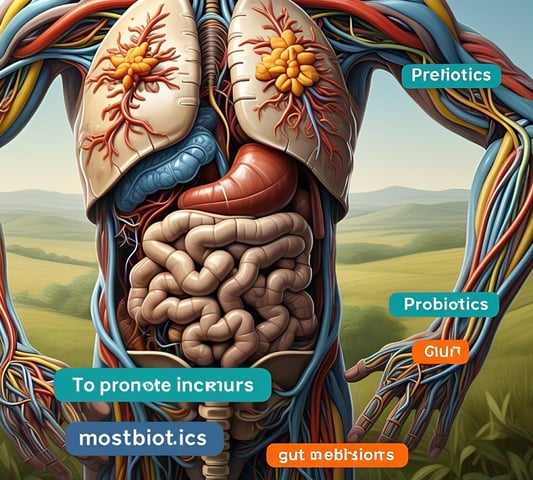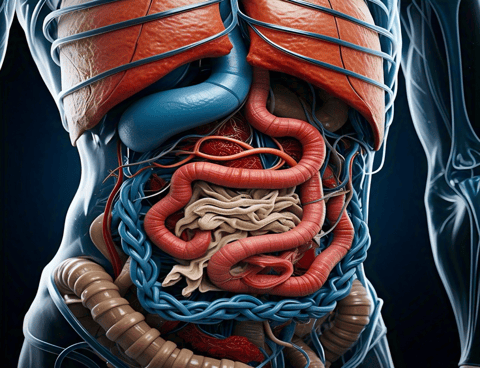Gut Health: Boost Digestion, Immunity & Mental Clarity Naturally
Discover the power of gut health beyond digestion! Learn how your gut microbiome influences immunity, mental clarity, and overall well-being for a healthier life.
HEALTH TIPS
2/16/20255 min read
Gut Health as the "Second Brain" – The Growing Interest in Gut Health Beyond Digestion
The Gut: More Than Just a Digestive Organ
The gut, or gastrointestinal (GI) tract, is a highly sophisticated system that breaks down food, absorbs nutrients, and expels waste. But its role is far more extensive than digestion. The gut is inhabited by trillions of microorganisms, also referred to as the gut microbiome, that engage with our bodies in myriad ways that impact our physical and mental well-being.
The gut microbiome is made up of bacteria, viruses, fungi, and other microorganisms that coexist in an intricate balance. When this equilibrium is upset, it can give rise to a condition known as dysbiosis, which has been associated with a myriad of health problems, ranging from inflammatory bowel disease (IBD) and obesity to diabetes and even mental illnesses such as anxiety and depression.


How the Brain Affects Gut Health
Stress, anxiety, and other emotions can directly affect gut health. The brain can influence gut motility, secretion, and permeability to cause symptoms such as bloating, cramping, and diarrhea. Stress management is hence an essential part of ensuring gut health.
Conclusion
Gut health isn't solely digestion anymore—it's about cognitive clarity, immunity, and health in general. By developing our gut microbiome through diet, lifestyle modifications, and prebiotic, probiotic, and postbiotic supplementation, we can maximize the potential of our "second brain." With each new discovery about the immense influence of our gut health on our lives, there is no doubt that maintaining a healthy gut is key to leading a healthy, vital life.
So, next time you consider your health, make sure to listen to your stomach—it may just be the magic that unleashes your better self.
The Role of Prebiotics, Probiotics, and Postbiotics
To promote gut health, it is important to know the functions of prebiotics, probiotics, and postbiotics—three essential elements that collaborate to ensure a healthy gut microbiome.
1. Prebiotics: Fuel for the Gut
Prebiotics are inedible fibers that are consumed by good bacteria in the intestines. Foods such as bananas, onions, garlic, and asparagus and whole grains contain prebiotics. Prebiotics ensure there is a well-balanced microbiome and optimal digestive health through the stimulation of good bacteria to grow.
2. Probiotics: The Good Bacteria
Probiotics are live microorganisms that impart health benefits when ingested in sufficient quantities. They occur in fermented foods such as yogurt, kefir, sauerkraut, kimchi, and kombucha, and in supplement form. Probiotics restore the equilibrium of the gut microbiome, enhance digestion, and boost immunity.
3. Postbiotics: The Fermentation Byproducts
Postbiotics are the by-products of the metabolic activity of probiotics during a fermentation process. They are short-chain fatty acids (SCFAs), enzymes, and peptides. Postbiotics possess anti-inflammatory, antimicrobial, and immune-modulating activity, which makes them critical for intestinal health and well-being.


How the Gut Affects Mental Health
Studies have found that the gut microbiome significantly influences mood regulation and cognitive functioning. The gut secretes neurotransmitters such as serotonin, dopamine, and gamma-aminobutyric acid (GABA), which play a key function in mood modulation. Indeed, about 90% of serotonin, also referred to as the "feel-good" hormone, is secreted in the gut.
Research has further associated gut dysbiosis with mental illnesses. For instance, patients with anxiety and depression typically possess a deranged gut microbiota as compared to healthy volunteers. This observation has seen the development of psychobiotics, which are designed specifically to focus on mental disease by modulating the gut-brain axis.
The Gut-Brain Axis: The "Second Brain" Connection
The gut has been nicknamed the "second brain" due to its large network of neurons and capacity to talk to the central nervous system (CNS). This two-way communication system is referred to as the gut-brain axis. The brain and gut are linked by the vagus nerve, hormones, and immune system pathways, which enable them to regulate each other's activities.




Gut Health and Chronic Diseases
Recent studies indicate that gut health has a strong association with the etiology of chronic diseases. A few examples are as follows:
1. Obesity and Metabolic Syndrome
An unbalanced gut microbiome has also been linked with obesity and metabolic syndrome. Some gut bacteria have the ability to extract more energy from a meal, contributing to weight gain. Moreover, dysbiosis can lead to insulin resistance, a primary cause of type 2 diabetes.
2. Cardiovascular Disease
The gut microbiome is involved in cholesterol regulation and blood pressure. Certain gut bacteria synthesize trimethylamine N-oxide (TMAO), a substance associated with a higher risk of heart disease.
3. Autoimmune Diseases
Rheumatoid arthritis, lupus, and multiple sclerosis have been associated with gut dysbiosis. A leaky gut can permit harmful substances to pass into the bloodstream, provoking an immune response and leading to inflammation.
The Future of Gut Health Research
Gut health is a fast-changing field, with new research uncovering the complex interplay between the gut microbiome and health. Scientists are investigating the promise of personalized nutrition, fecal microbiota transplantation (FMT), and genetically modified probiotics to prevent and treat disease.
As our knowledge about the gut-brain axis advances, we'll begin to experience more precise therapy for mental disorders, autoimmune disease, and chronic illnesses. Personalized medicine will even utilize the gut microbiome, tailoring treatment to the individual's very own microbial community.
How to Support Gut Health
A healthy gut demands a well-rounded approach of diet, lifestyle, and managing stress. Below are some effective tips:
1. Consume a Varied, Fiber-Loaded Diet
A fiber-packed diet with high consumption of fruits, vegetables, whole grains, and legumes ensures the gut microbiome is well-nourished and provides the necessary nutrients and fiber for optimal health.
2. Use Fermented Foods
Fermented food such as yogurt, kefir, sauerkraut, and kimchi is great for getting a probiotic diet. Taking in these foods into your body may help restock good bacteria for the gut.
3. Get Hydrated
Hydration is vital when it comes to digestion as well as maintaining gut mucosal linings. Aim for a daily intake of water of at least 8 glasses.
4. Stress Management
Chronic stress can be detrimental to gut health. Use stress-reducing methods such as meditation, yoga, deep breathing, or spending time outdoors.
5. Exercise Regularly
Exercise supports healthy digestion and a healthy gut microbiome. Get at least 30 minutes of moderate exercise most days of the week.
6. Avoid Overuse of Antibiotics
While antibiotics are necessary for treating bacterial infections, overuse can disrupt the gut microbiome. Use antibiotics only when prescribed by a healthcare professional.
7. Consider Probiotic and Prebiotic Supplements
If you’re unable to get enough probiotics and prebiotics from your diet, consider taking supplements. Consult with a healthcare provider to determine the right products for your needs.
Gut Health and Immune Function
The gut is an integral part of the immune system and contains about 70% of the body's immune cells. The gut-associated lymphoid tissue (GALT) provides a barrier against harmful microbes while allowing tolerance to harmless microbes.
An intact gut microbiome enhances immune function by:
- Producing antimicrobial peptides that destroy bad bacteria.
- Controlling the production of immune cells.
- Keeping the lining of the gut intact, avoiding leaky gut syndrome.
Dysbiosis, however, can compromise the immune system, rendering the body vulnerable to infections and autoimmune conditions.
The term gut health has, over the past few years, shifted from being strictly related to digestion to being identified as the foundation of well-being in general. Frequently coined as the "second brain," the gut is a crucial part of mental acuity, immunity, and health as a whole. This paradigmatic change has fostered increasing enthusiasm for the gut microbiome and how it impinges upon our health. In utilizing prebiotics, probiotics, and postbiotics, scientists as well as fans of health and wellness are tapping into the power of gut well-being in improving different areas of human health. This blog explores the science of gut health, its effects on body and mind, and how we can cultivate our gut for best wellness.
Eating Whats
Revitalize your body this winter! Boost energy, support joints, and burn fat naturally with proven remedies for a healthier, more active you!
Wellness
team.eatingwhats@gmail.com
© 2025. All rights reserved.
